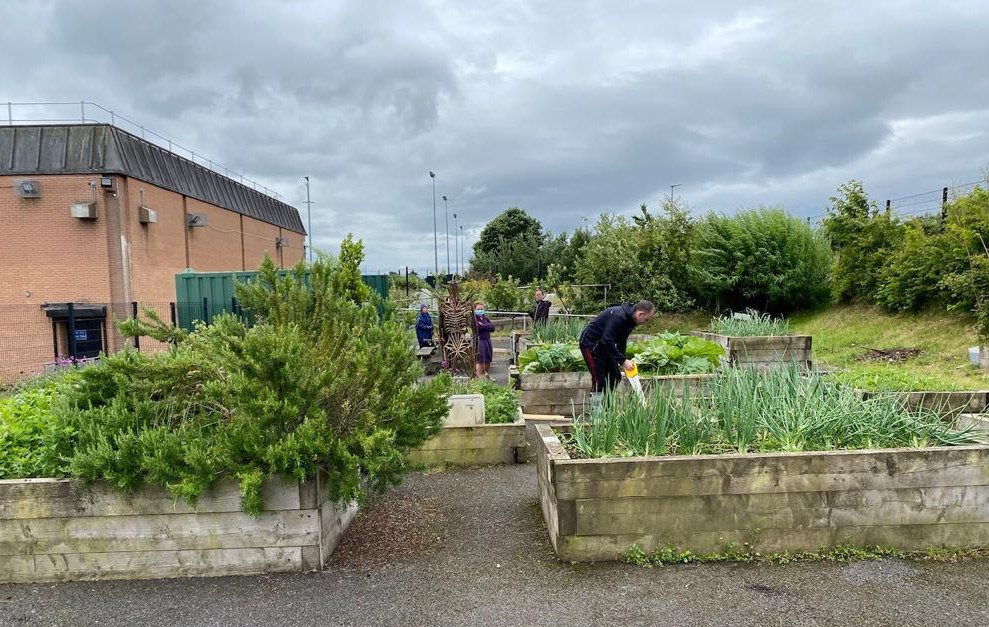Ag Tógail Gairdín an Phobail - Ná hAbair é, Déan é (Part 2)
In this second part we present examples of the ‘ná habair é, dean é’ philosophy of community organising, that sees local communities empowering themselves, by digging where they stand.
PPR’s founder, Inez Mc Cormack, whose legacy includes leading the Irish Congress of Trade unions and implementing the MacBride Principles, cut her teeth as a social worker in Ballymurphy in West Belfast.
Back in the sixties, places like Ballymurphy effectively had no government and no social or economic support was forthcoming. As a blow-in of some ten years to this community, I have learned from the people who lived through that period how they responded to this official neglect and invisibility.
They set about doing it themselves. There were no shortage of pioneers in humane economics and community wealth building. These crafty animals scrounged resources and skills to develop self-help initiatives, cooperative industries, housing developments and schools. There was no waiting for permission. Their first idea was not to fill in a funding application before you could help your neighbours.
All of this happened during a conflict in the face of serious challenges. Without romanticising the harshness of life in West Belfast during the conflict, that these revolutionary community wealth building initiatives took hold in such circumstances, gives us a glimpse of what’s possible with dreams, ambition and community solidarity.
Sadly, a lot of the self-help ethos was eroded over the 50 years of war, peace, ‘economic growth’ and ‘community development’ that followed. But not completely. The legacy of this transformative and prefigurative activism is still there – not least in the energy and activism of the ever-growing Irish Language movement. From wee acorns on the Shaws Road to An Dream Dearg – an unstoppable force for change nourishing thousands of families in a future facing movement, with politicians of every hue taking action in response.
The pandemic has shown us that political leaders and decision makers can take swift action at scale to solve problems, but also that they are more often following the public who lead the charge for change.
When Covid hit, political leaders floundered while communities sprang into action with inspirational acts of collective self-care that felt like it rippled across the whole world. It wasn’t political leaders and officials who moved first, but diverse communities with all the skills and talents that make society function. The front-line workers, carers, educators, builders, distributors, who barely feature in calculations of Gross Domestic Product – which Robert Kennedy Junior said ‘measures the value of everything except that which makes life worth living’.
And so now – as politicians are under immense pressure from powerful and wealthy interests to put the ‘economy’ back in its place of primacy - ahead of public health, mental well-being, environmental protection and community development - where do we go next?
To paraphrase the veteran Irish civil and human rights campaigner, Bernadette McAliskey ‘we dig where we stand’. Asked for her advice on building a better future in a recent talk hosted by Glor Na Mona, she imparted those words of wisdom.
For some months now, an eclectic group of guerrilla gardeners have taken these words literally - in gardening and growing spaces across the city we have been coming together to learn how to grow food and help each other out.
When the petrol bombs were flying and the men of the past were organising riots in response to protocols and big picture Brexit economics, we were making seed bombs to throw around concrete housing estates.
Communities all over the world have seen an explosion in gardening and growing projects big and small. People have transformed their own homes and brought dead space to life. The economists measuring GDP will hardly blink at the impacts. But the transformation has been wonderful to see – bees, birds, people – springing into life, taking control of the space around them, making and sharing things and feeling great about it in the process – asking permission from no one, making it up as you go. These small acts of kindness and solidarity when extrapolated at a global scale amount to something truly revolutionary.
Protesting and disrupting multinational tax dodging supermarket chains as well as lobbying and engaging to hold political institutions accountable is of course essential. It is also worth reflecting on how much we are genuinely divesting from the bad politics and economics, or fuelling it?
By growing more of our own food with less of the chemicals and price tags and in building our own fledgling economic institutions, we can invite good politicians and civil servants along, setting an example for them to follow and mainstream if they have the will.
What would the economy and politics look like if every community was the people’s garden – a place to pool ideas, resources and talent, break bread and build the future together.
Gairdín an Phobail is a tiny wee example amongst a million positive efforts in this vein – A collaboration for land justice and food sovereignty between Springhill Community House, Anaka Womens Collective, Glór Na Mona, sheltered housing residents, GROW, decent spuds at Belfast City Council, and PPR campaigning groups.
It sounds like an elaborate, complicated coalition but really it is just a bunch of people who are willing to lift a shovel and try something new together - Ná hAbair é, Déan é!